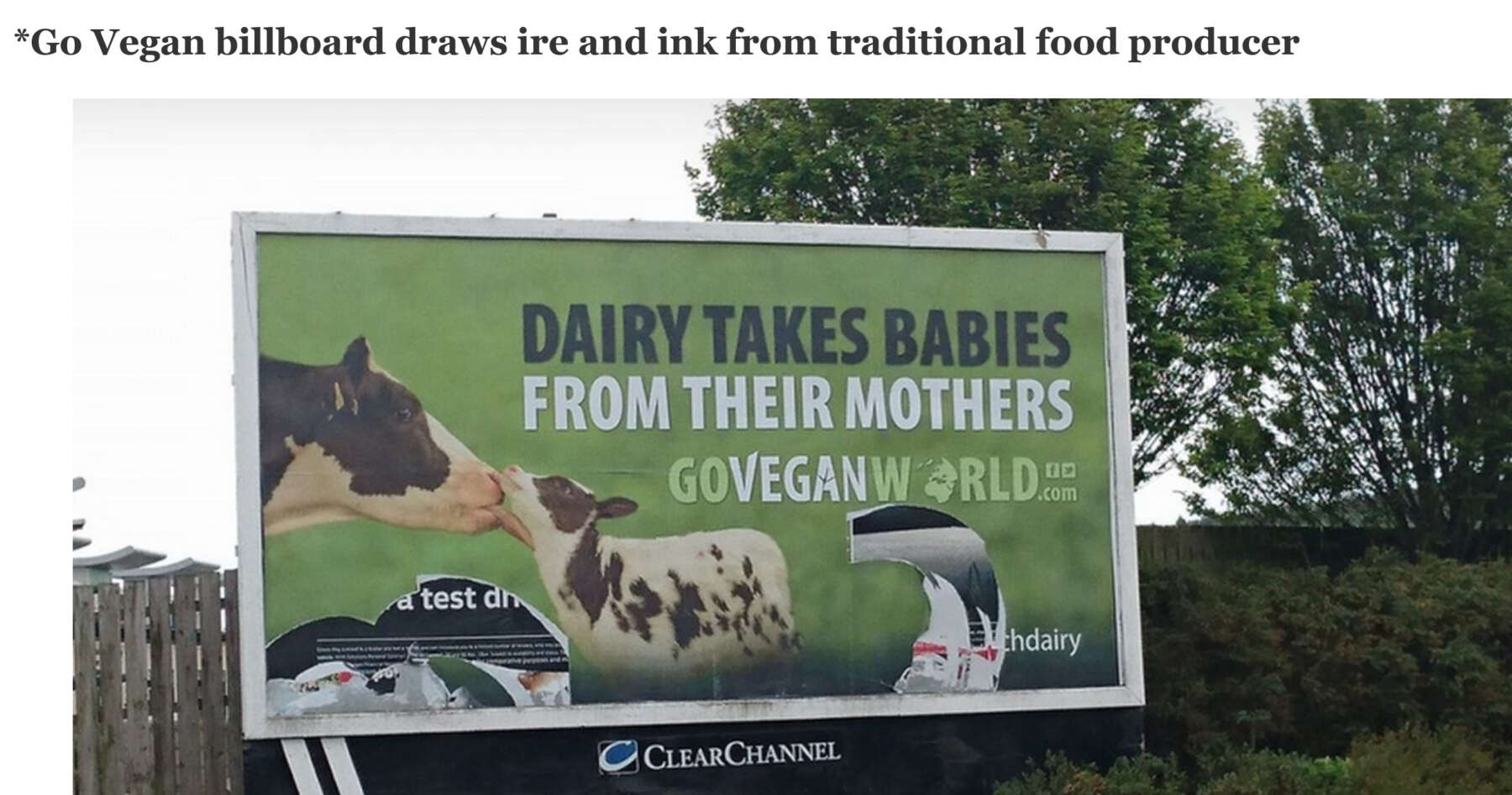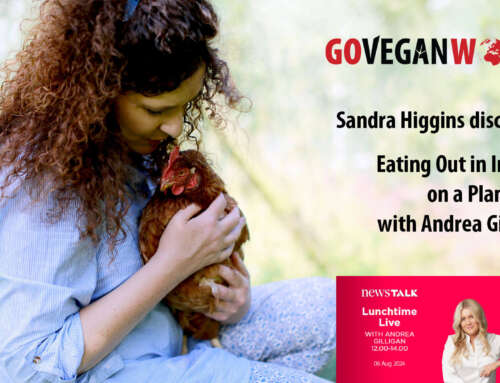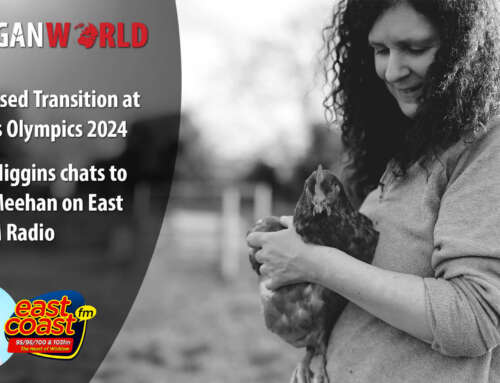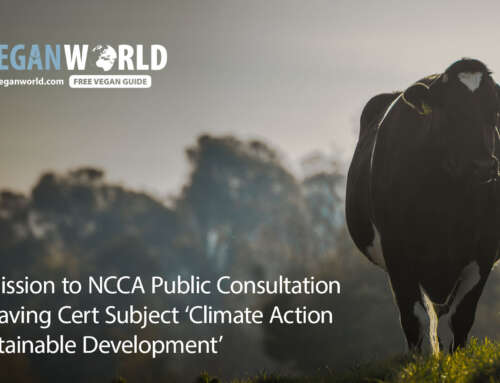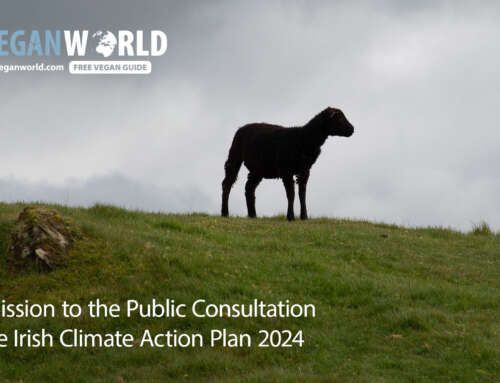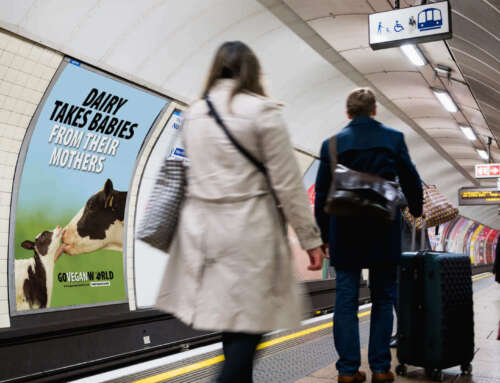17th February 2022
The Backlash By Animal Exploiting Industries to the Growth of Veganism
An article in the Irish Independent in 2018*, illustrates how threatened the animal exploiting industries are by anti-speciesist, vegan education (full text of the newspaper article below). An increasing number of people become aware of the facts of speciesist, animal use, every year through the work of animal rights education and the promotion of veganism by organisations but also through the very powerful work of individuals who influence their family, friends and colleagues in person and on social media. It is reasonable to assume that the numbers of people going vegan is increasing. There is most certainly an increase in the production and availability of vegan friendly foods, clothing and personal care, cosmetic and cleaning products. While consumerism does not equate with the moral belief that underpins veganism and is not a necessary nor sufficient criteria for respecting the rights of other animals, it at least shows that there is a growing demand for goods that align with their beliefs by people who avoid animal exploitation and use, not only in their diet, but in other aspects of their lives as well,
The backlash by the animal exploiting industries and those who represent them has been remarkable. The article reprinted below uses a photograph of a failed attempt to tear the Go Vegan World advert from its billboard, something that has occurred on more than this occasion. Try as they might to prevent the truth from being exposed, the public are learning about the abhorrent practices on which seemingly benign products such as dairy, flesh, eggs, leather and wool are predicated, and discovering that these products are unnecessary and can be very easily replaced by plant-based alternatives. The public are becoming aware that the animals they so thoughtlessly used and imagined to be inferior to them, are feeling beings who have rights.
Industry representatives persist in defending the indefensible exploitation of innocent animals by referring to their irrelevant standards of animal welfare, irrelevant because animal welfare is simply a set of guidelines on how animals are bred to be killed for profit. Advocates of these abhorrent industries choose to remain oblivious to the fact that it is not how animals are treated that is the crux of the issue, but the fact that we use feeling animals who value their lives as much as we value our lives, as if they were inanimate objects, breeding, exploiting and killing them for products that we do not need. Few of these ‘agvocates’ are willing to invite the public onto their pig and chicken farms, or willing to show them taking newborn calves from their mothers on dairy farms, of to invite us into slaughterhouses to show their young animals being brutally killed in exchange for money. On numerous occasions our Go Vegan World ads have been accused of being being misleading despite the fact that subsequent investigations found them to be factual. The irony is that the most misleading industries of all are those promoting animal use. There is not a single manufacturer, anywhere in the world, willing to provide accurate information on their packaging that informs consumers of the reality of animals’ lives and their brutal deaths, or the facts on the intersectional damaging effects of animal agriculture on the environment and human health. Instead they obfuscate and perpetuate the myth that because humans need ‘essential’ nutrients (i.e. nutrients that are not produced by the human body and must be sourced in our diet), the addition of those nutrients to animal’s diets and the subsequent presence of them in animal products equates with those products being ‘essential’ components of our diet. Most of the claims made on the nutritional profile of animal products omit the fact that animals are given supplements of vitamins and minerals to ensure sufficient intake and their presence in the products of their bodies. The facts on plant only diets are quite clear: they are nutritionally adequate and can help prevent many diet related diseases and premature mortality.
Facts are distorted or omitted from the information provided by those with a vested interest in ensuring that people continue consuming animal products. The article below states that Ireland “is one of the lowest emitters of carbon in the world”. On the contrary, Ireland is one of the worst, if not the worst, performers in the EU in terms of responding to the climate crisis. An astounding 37.1% of our GHG emissions is attributable to agriculture, and most of that is animal agriculture (EPA, 2021).
Instead of embracing the need for change to veganic and non-animal agriculture, which will benefit ecosystems, reduce global warming, respect other animals, and improve human health, the industry, like the tobacco industry before it, is clinging desperately to the status quo of animal use, with little regard for anything but short term profit and convenience. While top down change is necessary in the form of government support for a just transition to plant agriculture, every individual can play their part by abolishing animal use from their lives and creating a demand for a more ethical alternative. Unless we live as vegans, we cannot claim to live ethically.
*Go Vegan billboard draws ire and ink from traditional food producer
There are changes in the world around us that come creeping up on us and there are those that march right up to our noses and announce: Here I Am.
The nationwide Go Vegan campaign occupies the latter category and its boldness tells us that it means business and is here to stay.
In its boldness, it strikes at the heart of the industry it’s so vehemently opposed to and it’s taking its message right to the core of ‘enemy’ territory.
Here in Castleisland a ‘Go Vegan’ billboard has gone up on Davy Griffin’s Newsagent’s gable wall on the Barrack Street side.
It is a very strategic location in a very strategic town. It’s on a one way circuit and you can’t miss it. It’s also on the main route out of the town centre to Killarney and Tralee.
This is the second time this particular poster appeared at this location. It was there a couple of months ago and disappeared. It was replaced by adverts for various radio stations since and until this week.
The ‘up to our noses’ feeling about the campaign was brought just there to me by a full-page, broadsheet advertisement in Saturday’s issue of The Irish Times.
This advert made really clever use of the old and much loved nursery rhyme, Mary Had a Little Lamb.
In the advert, Mary is depicted leading her trusting little lamb to a slaughter house in which we see the silhouette of a man holding a butcher’s knife.
This time however, Shane McAuliffe, from the well known McAuliffe pig producers and transport company, takes on the Go Vegan campaign and waves a flag for his fellow, traditional food producers in The Kerryman.
Shane’s family owns a string of pig farms where they produce more than 50,000 pigs each year. They also operate one of Ireland’s longest established haulage companies and are founder members of the Truly Irish food brand.
Shane McAuliffe’s Reaction:
“I felt compelled to pen an open letter in response to the ‘Go Vegan’ billboard on Barrack Street.
I have no issues with how someone should live their life or what lifestyle choice they choose. I do however have issues with people whose sole aim is to close down Irish family farms. While I am most well known for being a pig farmer, and to a lesser extent, a beef farmer, I am not a dairy farmer. I do believe in facts. and I have made a few points below.
Castleisland is and always has been known as a market town thanks to the rich agricultural hinterland of the Maine Valley which is ideal for sustainable grassed based dairy production.
Our town, and its people are heavily reliant on agriculture and farming, which of course can be seen every Monday and Wednesday as farmers flock from all over Munster to Castleisland Co-op Livestock Mart.
Other prominent employers directly involved with dairy farmers include: Castleisland Co-Op Mart; Gortatlea Mart; Rhyno Mills; Brownes Agri, Steel & Builder Providers; Kerry Agribusiness; Walsh Farm Machinery and many more. How many dairy farmers and their families visit all our shops each and every day and keep local money in our economy I wonder?
Irish dairy production allows cows to have the freedom to graze outdoors for up to 300 days per year, more than anywhere else in the world. The Gulf Stream ensures our temperate climate is neither too hot or too cold for cows.
During the winter months they enjoy shelter, rest and natural grass silage to keep them happy and nourished until spring arrives and they can return outside. While we complain about the rain, Irish cows are provided with a natural and nutritious diet that does not require mechanical irrigation or energy costs.
This natural resource ensures that Ireland is one of the lowest emitters of carbon in the world (certified by the Carbon Trust in the UK). Our green grass grows three times as much as the European average and Irish farmers can chose grass varieties and offer exceptional nutritional value and easy digestibility for cows.
Sustainability: Ireland has the world’s first national dairy sustainability scheme. This allows farmers to measure their continuous improvement of efficiencies and sustainability practices. Audits for this focus on food safety, food quality and animal welfare.
A carbon navigator helps dairy farmers to reduce emissions even further.
The importance of dairy in your diet. I could write so much about dairy goodness but I’ll stick to a few facts. Milk is a natural source of vitamins B2, B5 and B12. These vitamins generates energy in our bodies, reducing the feelings of tiredness and fatigue and the normal functioning of the immune system. Iodine contributes to normal cognitive function.
Cognitive functions includes memory, attention, perception, reasoning and the ability to retain information. Guess what is a source of iodine? Yes, it’s milk! Phosphorous is a key nutrient for bone health and plays an important role in the normal growth, development and maintenance of bones and teeth.
Potassium is an important mineral for maintaining normal blood pressure, especially in a time where Irish adults have high blood pressure. Protein is a nutrient we need for normal muscle growth and maintenance, milk contains all of the essential amino acids that our body needs.
Dairy products like yogurt and cheese contain all of these nutrients too. The Department of Health’s Food Pyramid recommends three servings from the dairy group each day as part of a healthy, balanced diet.
Non dairy alternatives. Do we grow almonds? Do we grow soya? Do we grow rice? Do we grow coconuts? Nope, Irish farmers don’t grow any of these.
They are grown in far flung parts of the world. Places where deforestation takes place at the cost of larger amounts of energy, water, natural resources and emissions just to put that carton of dairy free “milk” on a shelf in Ireland.
You can’t milk rice, or a coconut, or an almond or soy. Check the ingredients of these cartons, you see emulsifiers, stabilisers, water, nuts, up to a dozen ingredients. Check the ingredients of a carton of milk, you see one ingredient, yup, you guessed it, milk!!
To summarise, we can’t ignore the facts regarding the value of dairy to our country and the greater world. Dairy exports are worth well over €3billion to our economy. We export our dairy produce to 130 countries.
We supply more than 10% of the world’s infant milk formula. We produce enough dairy produce and milk to feed 52million people every year.
I was recently very honoured to be ranked second in Ireland on the prestigious Alltech Top 500 ‘Agvocates’ in the World for 2018. An agvocate is someone who uses their social presence to promote agriculture and farming.
One of my aims this year is to spend more time with education, whether that is hosting farm tours or lecturing third level students. I was recently invited to a panel discussion hosted by Nuffield Ireland on Fake News and it’s Implications for Agriculture.
I would call on all local farmers to be proud of their high welfare production systems, and to not be afraid of sharing positive news.
Perhaps local farmers could visit some of our schools to tell students about their farms, or host school tours?
I would also call on schools and teachers to avail of the free services Agri Aware (the Irish agri-food educational body) provide to primary and secondary schools.
Their Incredible Edibles programme is a healthy eating initiative for primary school pupils which supplies schools with growing packs for carrots, lettuce, potatoes, strawberries and turnips. Our youth deserve to have the information on where their food comes from and understand the economic, social, environmental and cultural importance of the Irish agri-food industry.”

